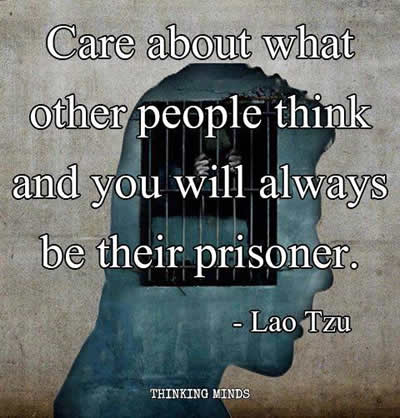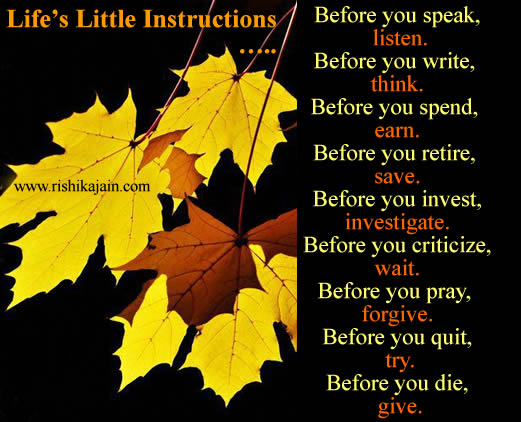
True greatness
“TRUE GREATNESS”
A man is as great as the dreams he dreams,
As great as the love he bears;
As great as the values he redeems,
And the happiness he shares.
A man is as great as the thoughts he thinks,
As the worth he has attained;
As the fountains at which his spirit drinks,
And the insight he has gained.
A man is as great as the truth he speaks,
As great as the help he gives,
As great as the destiny he seeks,
As great as the life he lives.
"بزرگي و شأن حقيقي"
بزرگي و شأن انسان
در بزرگي و شأن روياهايش،
در عظمت عشقش،
در والايي ارزشهايش،
و در شادي و سرور تقسيم شده اش نهفته است.
بزرگي وشأن انسان،
در بزرگي شأن افكارش،
در ارزش ثجسم يافته اش،
در چشمه هايي كه روحش از آنها سيراب مي گردد،
و در بينشي كه بدان دست يافته ، نهفته است.
بزرگي و شأن انسان،
در بزرگي و شأن حقيقتي كه بر لبان جاري مي سازد،
در ياري و مساعدتي كه بذل مي كند،
در مقصدي كه مي جويد،
در چگونه زيستن او نهفته است.
سي. اي. فلين
The difference between a task and an exercise
One of the most salient characteristics of new methodologies of English language teaching is the focus on tasks and real-world activities. Syllabus designers are concerned more on how to satisfy learners needs to be able to communicate appropriately in real-world context than on only insisting on the accurate linguistic use. Most textbooks now include tasks and activities that have a communicative outcome as well as language exercises that yield accurate use of language.
What is the difference between tasks and exercises?
An English language teacher must be able to distinguish between exercises and tasks. They have different purposes and yield different results.
Task
Tasks and Exercises
A task is a communicative act that does not usually have a restrictive focus on a single grammatical structure and has a non-linguistic outcome. There is also a further distinction between a real-life task and a pedagogical task. The latter is devised mainly for pedagogical purposes within the classroom setting. Real-world tasks, however, are communicative tasks that are achieved through language outside the classroom. The following are the main characteristics of tasks.
- Tasks are free. Students are given free will to use language for communicative purposes.
- Focus on multiple skills rather than on one.
- Tasks are used in context.
- Tasks are communicative and usually authentic.
- Tasks are meaningful and focus is on content.
- Correction of tasks is delayed and is done through observation and awareness raising.
Exercise
An exercise usually has a restrictive focus on a single language element, and has a linguistic outcome.
- A language exercise is guided and controlled by the teacher.
- An exercise usually has a restrictive focus on a single language element, and has a linguistic outcome.
- The focus is usually on a single skill.
- There is no reference to the context.
- A language exercise is not communicative and usually not authentic.
- It is not meaningful and the focus is on form rather than on content.
- Correction is usually done immediately.
Examples of exercises and tasks
Examples of exercises include, according to Jack C Richards drills, cloze activities, and reading comprehension passages. Examples of tasks include any type of activity whose outcome is not only linked to learning language but also to do something with the language.
An example of a Language exercise
Fill in the blanks with the simple past form of these verbs: write, go, have, study, buy.
- Yesterday, Nancy______to school and ______English.
- Last week, Leila________ an interesting book about the history of the United States.
- We______a delicious breakfast this morning.
- She _______ an email to her pen pal last night.
An example of a task
Pedagogical tasks simulate real-life tasks.
Planning a party. Learners will be asked to do the following:
- agree on what they need for the preparation,
- choose the place where the party will be held,
- prepare for the party,
- write invitation letters…
I've learned that
I've learned that
no matter what happens, or how bad it seems today, life does go on, and it will be better tomorrow
I've learned that
you can tell a lot about a person by the way he/she handles these three things: a rainy day, lost luggage, and tangled Christmas tree lights
I've learned that
regardless of your relationship with your parents, you'll miss them when they're gone from your life
I've learned that
making a living is not the same thing as making a life.
I've learned that
life sometimes gives you a second chance
I've learned that
you shouldn't go through life with a catcher's mitt on both hands; you need to be able to throw some things back
I've learned that
whenever I decide something with an open heart, I usually make the right decision
I've learned that
even when I have pains, I don't have to be one
I've learned that
every day you should reach out and touch someone
People love a warm hug, or just a friendly pat on the back
I've learned that
I still have a
lot to learn
I've learned that
people will forget what you said, people will forget what you did, but people will never forget how you made them feel



 پشتیبانی و بروزرسانی وبلاگ گروه آموزشی ناحیه 2 ساری / فریبا روشن/
پشتیبانی و بروزرسانی وبلاگ گروه آموزشی ناحیه 2 ساری / فریبا روشن/